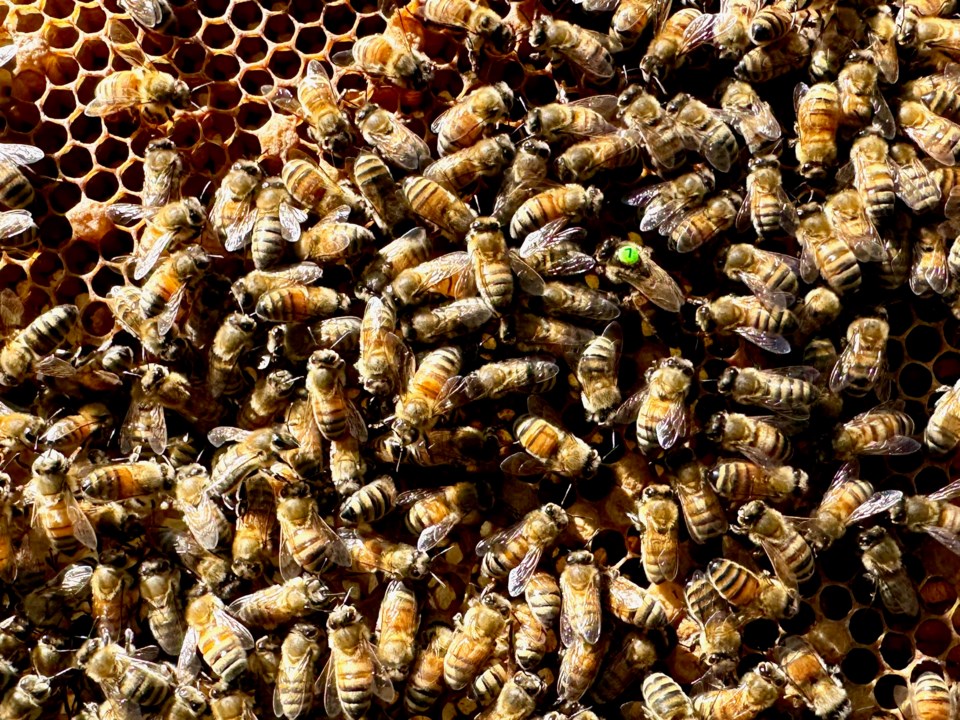In last week’s Opening Remarks, I made a (very funny) joke about a hypothetical swarm of killer bees, or the possibility of such a swarm, detracting visitors from driving up the highway to Whistler.
Smirking to myself, confident in the fact such a swarm was impossible, the stuff of made-up situations floated by jackass newsmagazine editors to make a point, I wandered outside Pique’s offices after completing the paper last Wednesday afternoon to enjoy the day…
And was immediately set upon by a massive swarm of bees (presumably of the killer variety).
Having never experienced such a phenomenon, I could only assume this was some sort of universal transaction playing out; my karmic chickens immediately come home to roost.
As I scooped up my puppy and scampered back to the safety of the office, I promised never to make another joke about bees.
But relaying the experience to my coworkers, I learned something new.
“They’re looking for a hive!” reporter Liz McDonald offered helpfully.
As a general rule, I am often skeptical of information shouted across open rooms, but having just read a story by Liz about bees in Whistler, I trusted she had an idea of what she was talking about.
Where my bees came from and where they were headed remains a mystery to me—by the time I built the courage to venture back outside they were gone—but bees are an increasingly common sight in town of late, and Whistler residents and guests to the resort have new ways to interact with one of nature’s greatest heroes this summer.
You probably read about Ensure Hive Future in last week’s Pique, or even saw them, hives and all, marching along the Village Stroll on Canada Day.
Through their website, you can book a two-hour, Whistler beekeeping excursion, or even immerse yourself in courses ranging from a 16-hour introduction all the way to a comprehensive, year-long beekeeping course complete with virtual field work.
But what, exactly, is all the buzz about? Just how important are bees, really?
To hear it from Ensure Hive Future’s Iain Glass, bees may represent the “canary in the environmental coal mine” for human kind.
“Our dependence upon honey bees is a reflection of environmental impact. A sound ecosystem has lots of native bees (remembering that honey bees are not native to North America). We have approximately 450 native bee species here in B.C. and around 4,500 in North America,” Glass said.
But bees and their benefits are not one-size-fits-all: bumble bees are better pollinators than honey bees if you are growing blueberries, Glass used by way of example—they fly in colder, wetter weather and can handle a wide variety of blueberry bush species.
But changes to B.C.’s farm land over the years play a role, too.
“When I was a youth the recommendation for the Fraser Valley was one honey bee colony for every two acres of blueberries. It is now two to four colonies per acre,” he said. “In fairness, it’s probable that the benefits are more appreciated now than back then, but we didn’t have the intense monoculture.”
Bees and plants have evolved symbiotically, Glass added, noting their tandem evolution only increased plants’ dependence on bees.
“The plants’ colours evolved, as did the nectar concentrations to be attractive to the appropriate bees. This includes the ability for some flowers to actually change the sugar concentration within seconds of the buzzing sound of the appropriate pollinator.”
Who knew nature could be so nimble?
You’ve probably heard how bees and their relationship to plants is vitally important to us humans. Most flowering plants rely on pollinators like bees to reproduce, and some say one out of every three bites we consume relies on pollination.
One famous (likely mis)quote, attributed to noted smart guy Albert Einstein, sums it up thusly: “If the bee disappeared off the surface of the globe, then man would only have four years of life left.”
Where the quote originated from isn’t clear, but “while probably true, he didn’t say it,” Glass said.
With that sense of urgency in mind, we can’t just throw any old bee at any old flower and call it a day—it’s native bees we really need, Glass said.
“Luckily, ‘save the bees’ resonates with a large portion of the populous. But passion not appropriately applied is dangerous. Throwing imported honey bees at the ecosystem is frequently harmful,” he said.
“The good thing is that once people start learning about honey bees, they start to understand the roles and balance within ecosystems—a pathway to education and change.”
I don’t know about you, but I sure am learning a lot about bees lately.
Learn more yourself and book your own excursion at ensurehivefuture.org.




